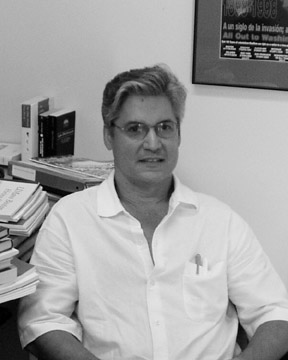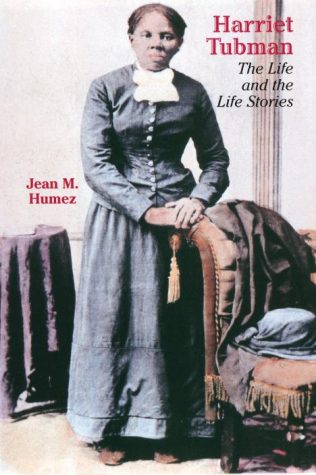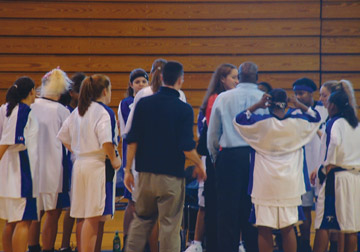CPCS: Angry Over Dean’s Resignation

Dean Ismael Ramirez-Soto talks while moving into his new office. – Photo by Gin Dumcius
September 10, 2003
\A heated war of words continues between the College of Public and Community Service and UMass Boston administration officials, on the heels of the resignation of the college’s dean.
Dean Ismael Ramirez-Soto stepped down to become a faculty member earlier this week, following an impasse in contract negotiations. While administration officials painted an amicable picture, CPCS faculty and staff were incensed, seeing the events as part of ongoing concentrated attack on the college as a whole.
“We were put in the position of starting a new semester without a dean,” said Sara Bartlett, administrative dean of CPCS. “People are very upset, very angry.”
CPCS contends that the dean was forced to resign or forfeit his rights as a faculty member.
“He was not removed as dean,” says Assistant Vice Chancellor Anita Miller, of the office of academic affairs. “He’s in a faculty position now, having, at his choice, having resigned as dean.”
On September 2, the first day of school for many, Dean Ramirez-Soto, in his first act as a faculty member of CPCS, sent out an e-mail alerting the CPCS community to his status as dean of the college and his contract. “On August 31, 2003 my contract as Dean of CPCS expired and I did not renew it. I did it to protect my rights as a faculty member at this university and to protect the integrity of the position of Dean of CPCS. The conditions the Provost offered me were totally unacceptable, and highly unfavorable to the College.”
Ramirez-Soto stated in the letter that if he had agreed to the provost’s offer, he would have been dean on a year-to-year basis, instead of the multi-year contract he had had since 1998. The provost’s offer also made him forfeit his right to seek tenure. If he resigned or didn’t renew the contract, he would return to CPCS as a lecturer for two years. “I made my decision not to renew the contract only because I was not given a viable alternative and because the Provost’s offer contradicted the very idea of what a collegiate dean is, namely, a legitimate member of the college’s faculty.”
In the last few days of August, already deteriorating negotiations steadily worsened. On August 26, Dean Ramirez-Soto submitted a counter-proposal: he would accept a year-to-year contract, but wanted to keep his “return to faculty rights,” and the right to be considered for tenure, the same terms as were included in the 1998 reaffirmation of his contract.
The afternoon of August 29, a Friday, rolled around, and Ramirez-Soto still had not received a response. He sent a letter to the provost invoking the “return to faculty” clause in his contract. At 5:00pm, writes Ramirez-Soto, the provost “personally delivered a letter to me reiterating his unwillingness to accept my revisions to return to faculty clause, and accepting my decision not to renew the contract.”
“I did not take this step lightly or happily. In fact, I am stepping down while protesting the treatment that this College has received and that I have had to endure as its Dean.”
On the afternoon of September 2, as news of Ramirez-Soto’s resignation was leaking out, Provost Paul Fonteyn sent out a university-wide e-mail, writing that Ramirez-Soto “elected to resign as dean” and decided to become a “full-time faculty member effective September 1.” Fonteyn praised Ramirez-Soto for revitalizing the college and integrating it into the university since it moved onto campus several years ago from its downtown location.
CPCS staff and faculty had met earlier behind closed doors in the Wheatley Student Lounge to discuss the situation, and reconvened at a policy board meeting on Thursday, which was open to the public.
Those there let loose their anger and frustration. “The chancellor is playing a game and we have to let her know we’re not going to play her game,” said Anne Marie Quammie-Allegne, a professor on community planning.
Ann Withorn, a CPCS professor on welfare rights, said, “Time goes fast when you’re getting screwed.”
The policy board also approved a CPCS community letter that was sent out to the entire university that afternoon.
The letter stated that Dean Ramirez-Soto had not, as Provost Fonteyn put it, “elected to resign as dean,” labeling it a “gross inaccuracy.”
“Dr. Ramirez-Soto ceased being dean because he was offered a contract that would have forced him to relinquish his rights as a faculty member,” CPCS staff and faculty wrote in the letter. “The contract the Provost offered did not include [a “return to faculty” clause], and the Provost refused to accept Dr. Ramirez-Soto’s request that a new contract include the very same clause as the contract then in force. The Provost did so despite the fact that Dr. Ramirez-Soto was the most senior dean on campus, the only collegiate dean of color, and the only dean to have been through two highly successful performance evaluations.”
The letter charted the course of contract negotiations, which had been going on since early March. UMB administration officials wanted to hold off until the results of his performance review. The performance review was extremely positive, and Ramirez-Soto’s approval ratings within the college were in the high eighties. A favorable AQUAD external review of CPCS followed soon after that. The administration did not comment on either report, the letter states. “The administration’s actions (and inactions) insult Dr. Ramirez-Soto and abuse the expressed will of our College… Such actions call into question the administration’s concept of leadership as well as their true intentions and their commitment to fairness.”
Assistant Vice Chancellor Miller responded, “Everybody here was pleased. The whole university is pleased that they had a positive AQUAD review. We’re pleased that the dean was reviewed positively,”
CPCS staff and faculty also have called the administration’s comments in The Mass Media last week “erroneous.” Specifically, the assistant vice chancellor’s comments regarding Ramirez-Soto’s clause, saying that he did not have a special clause, but there was “language allowing a discussion about beginning talks regarding tenure.”
A copy of an October 1998 letter from then-Chancellor Sherry Penney was obtained by The Mass Media, where she stated to Ramirez-Soto, “Should you return to faculty status before or at the end of this contractual period you will be granted a five-year non-tenure track appointment… That non-tenure track appointment will allow for conversion to tenure-track at your discretion with the tenure decision year to be determined by mutual agreement.”
“I didn’t give any contract details” in conversations with The Mass Media, says Miller. “I’m actually not at liberty to give any contract details, other than, reiterating again that he was offered a contract…he turned it down. I don’t know why he turned it down. I’m sorry he turned it down.”
“The provost wanted him to continue as the dean. I think the provost has been very clear all along that he wanted him to continue. I certainly did.”
This is not the first time CPCS faculty and staff and UMB administration officials have butted heads. Before the summer break, rumors of the college closing as a victim of budget cuts flew around. The rumors prompted many letters being sent to Chancellor Jo Ann Gora, pleading for CPCS’s life. At a meeting with college staff and faculty in April, Gora characterized the rumors as “hysterical,” “offensive,” and a “lousy way to do business,” since no one had asked her about the issue. CPCS was also experiencing problems with declining enrollment and skirmishes with the Admissions Office.
Students are expected to be unaffected class-wise by the dean’s resignation and other events swirling around the college. “We’re making sure the education process is uninterrupted by these events,” said Bartlett, adding that she was consistently impressed with the faculty’s and staff’s energy to get the semester started.
The semester started “as smoothly as any I can remember,” said Terry McLarney, undergraduate faculty chair.
“And we have a great new faculty member,” said Bartlett, with a sad laugh. “Ismael Ramirez-Soto.”
In his new office, which faces out onto a hallway overlooking Dorchester Bay and its sailboats, Ramirez-Soto sorts through his items, the hundreds of books now on the floor, the desk, and the chair.
He won’t be teaching classes this semester, and instead will focus on doing evaluations, meeting with students, and planning the three courses he expects to teach next semester.
“How do I feel? That’s a difficult question,” he says. “To say the least, I feel strange. I feel strange because I didn’t expect to transition into faculty in this way.” There wasn’t an opportunity to get everything said. Issues have been trumped and communication has been lacking.
“It should not have happened this way. That’s all I’m saying.”
Robert Hamilton and Carl Brooks contributed to this report.






















































